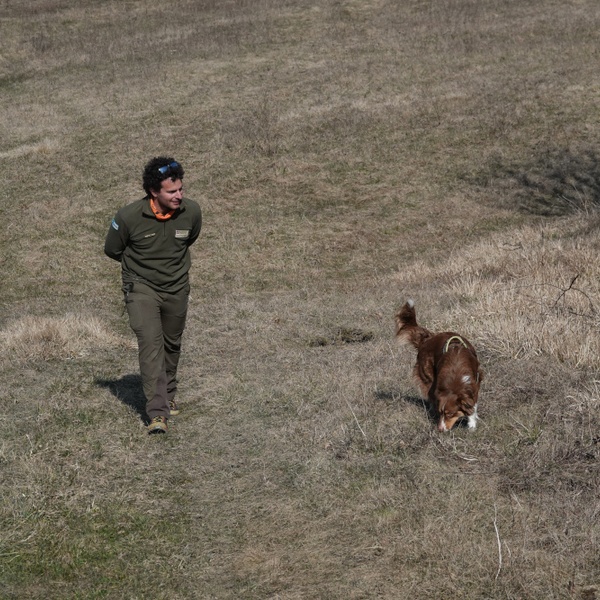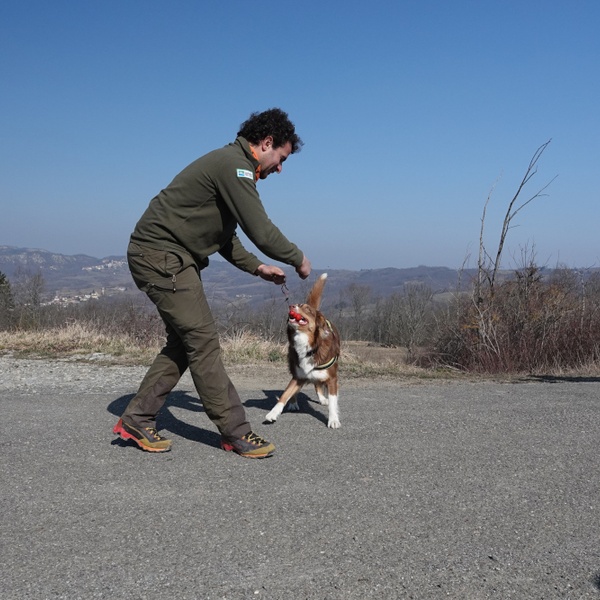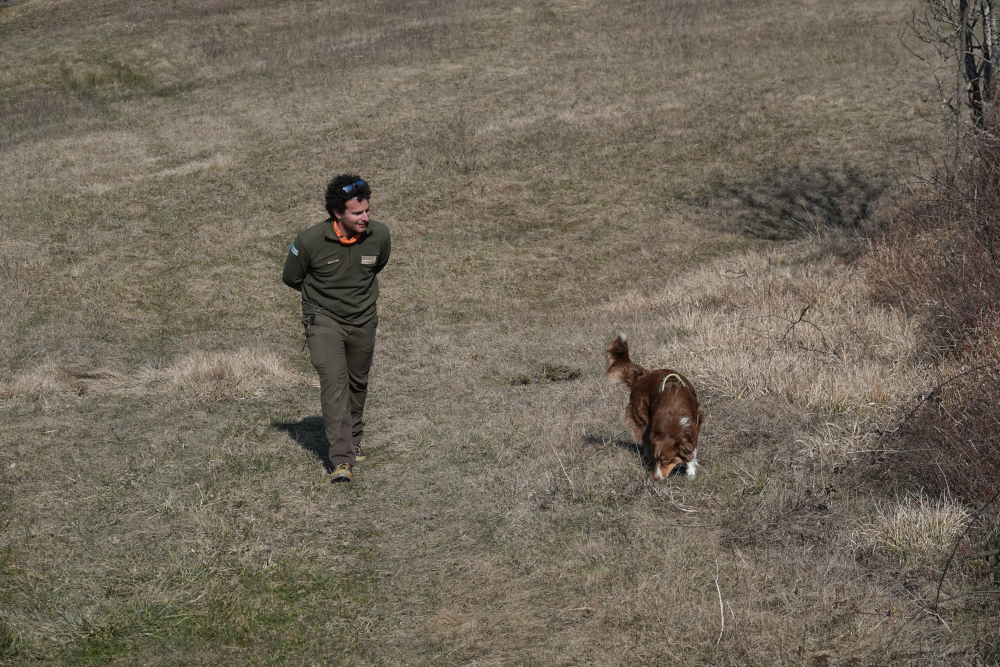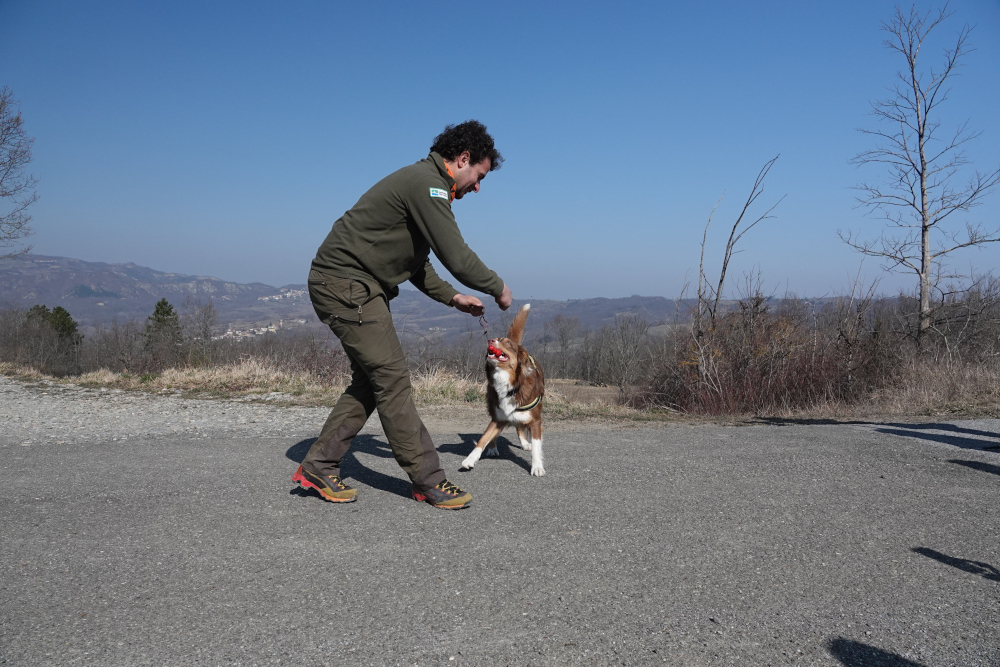Maya has obtained the anti-poison dog certification.
April 10, 2025Since April 1st, the Parks of the Cozie Alps can rely on a new Anti-Poison K9 Unit (UCA) in operation. The team composed of park ranger Lorenzo Brino and his Australian shepherd Maya has passed the final exam, the safety test that certifies the dog's ability to intervene independently in poison search activities. This is an important achievement made possible by the resources from the Life WolfAlps Eu project, which covered the costs of the dog's training and education to combat a cruel crime such as poisoning of both wild and domestic fauna. Maya and Lorenzo obtained certification with Mattia Colombo and his French pointer Argo from the Protected Areas of the Maritime Alps, completing a robust UCA team that includes Gianabele Bonicelli and Luna from the Protected Areas of the Cozie Alps, Carlo Geymonat and Myrtille from the Protected Areas of the Po Piemontese, along with other operational units in Lombardy and Liguria.
“This is the culmination of a long journey – says Brino – which began in 2022 when Maya was just 6 months old. What I initially took as a companion dog turned out to be a faithful work partner thanks to the insight of my colleague Bonicelli, who saw in us a useful resource to complement his team with Luna. Maya is now fully operational, but we must continue the training work every day independently as well as with trainer Roberta Bottaro, who has guided us so far.”
A well-matched team
When talking about Anti-Poison K9 Units, the term “team” is used intentionally because the dog and handler need to become a perfectly aligned pair, a sort of six-legged animal. Firstly, daily exercise is essential for the four-legged member to stay focused on the automations to apply during real operations, and for the two-legged member to always closely observe the behavior of their companion, finding the best strategies to lead and guide them effectively. Thanks to its sense of smell, the dog learns to recognize possible food baits or the presence of commonly used poisons, such as slug poisons and rodenticides.
“The dog is encouraged to perform the work – continues Brino – because it knows it will be rewarded; in Maya's case, the reward is playing with a ball. But, above all, it must learn not to consume anything it finds around to avoid the risk of getting poisoned itself. This was the most important aspect, evaluated during the recent exam we passed. It is also a habit that all dog owners should teach their companions to avoid unpleasant surprises. Unfortunately, some people resort to the use of poisons not only to eliminate wild animals such as the wolf, but often also against domestics such as companion dogs. This is a particularly heinous and insidious crime that causes damage to the entire food chain in nature down to scavengers.”
The importance of training
Maya and Lorenzo perform exercises regularly to maintain high concentration. The training involves searching for 3 or 4 food baits hidden over one hectare of land or inspecting limited areas such as road edges using a long leash. Not to mention the work with poisons, which occurs exclusively indoors to prevent the risk of contaminating the natural environment, involving hiding various objects and substances under identical cones. It will then be the dog's job to signal the presence of suspicious odors solely based on its sense of smell.
“Ultimately – concludes Brino – the dog performs these tasks thanks to its keen sense of smell and instinct that nature has equipped it with. But it is the handler's job to provide the motivation and calmness that allow the dog to be more effective. The essence of the team lies here.”
The Life WolfAlps Eu project that initiated the work of the UCAs concluded in 2024, but after Life activities continue thanks to the commitment of the involved organizations and the contribution from the Capellino Foundation, which provides food for the anti-poison dogs with Almo Nature feeds.
You might also be interested in...
- campaign 39 anni da guardiaparco. Domenico Rosselli racconta una carriera nella natura
- campaign Valentina Mangini: 35 years as a park ranger between rigor and fantasy
- campaign A bond of security. Dogs on a leash in parks
- campaign Monitoring and prevention of fishing activities
- shopping_cart Le quattro stagioni nel Parco
- shopping_cart Nel Parco con gli acquerelli
- campaign "What a bunch of flowers" and the protection of wild flora
- campaign Mushroom Gathering 2024
- campaign The reasons for an obligation: Artva, probe and shovel
- campaign 5x1000 alla Ricerca Scientifica dei Parchi Alpi Cozie
 Ente Parchi Alpi Cozie
Ente Parchi Alpi Cozie



